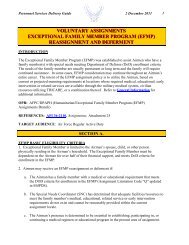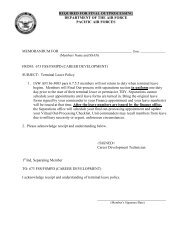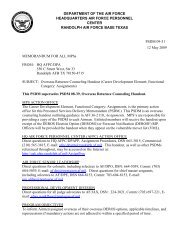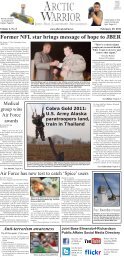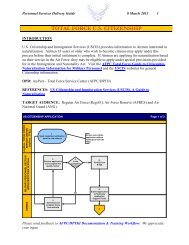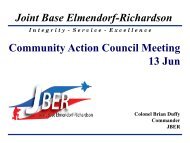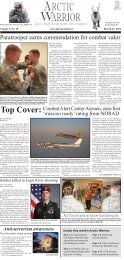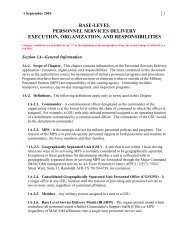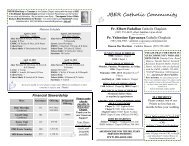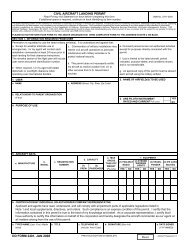Operation Dragon Foundation - Joint Base Elmendorf-Richardson
Operation Dragon Foundation - Joint Base Elmendorf-Richardson
Operation Dragon Foundation - Joint Base Elmendorf-Richardson
Create successful ePaper yourself
Turn your PDF publications into a flip-book with our unique Google optimized e-Paper software.
Be bear<br />
aware and<br />
safe with<br />
trash this<br />
spring,<br />
Page B-4<br />
Spice and<br />
salvia are<br />
incompatible<br />
with military<br />
service, page<br />
B-9<br />
Volume 2, No. 14<br />
Hospital<br />
sleep lab<br />
helping<br />
troops get<br />
shuteye<br />
By Airman 1st Class Jack Sanders<br />
JBER PAO<br />
www.jber.af.mil/news<br />
April 8, 2011<br />
Sleeping through the night can be a difficult<br />
task for anyone, but for individuals with<br />
sleep disorders, it can be almost impossible.<br />
Sleep disorders come in many forms;<br />
the most common, according to www.sleepfoundation.org,<br />
are restless legs syndrome,<br />
insomnia, sleep apnea, sleepwalking, snoring,<br />
teeth grinding and difficulty breathing.<br />
Those suffering from severe sleeprelated<br />
issues can schedule an appointment at<br />
the sleep lab at the 3d Medical Group at the<br />
<strong>Joint</strong> <strong>Base</strong> <strong>Elmendorf</strong>-<strong>Richardson</strong> hospital.<br />
Sleep labs are common across the U.S.,<br />
however, this is the only Air-Force-run sleep<br />
lab in the Pacific Air Forces, said Air Force<br />
Staff Sgt. Stanley Manning, 3d MDG sleep<br />
lab technician.<br />
The lab’s technicians monitor patients<br />
in their sleep. Technicians closely watch<br />
brain-wave activity, along with several other<br />
bodily functions, like heart rate and breathing.<br />
After the study is concluded, all of the<br />
technicians’ information goes to<br />
a neurologist who will determine<br />
if the patient has a sleep disorder.<br />
For some patients, multiple trips to<br />
the sleep lab are common.<br />
People with sleep disorders<br />
can have multiple problems while<br />
awake as well. Not being alert<br />
or falling asleep during daytime<br />
hours can be a large problem for<br />
military members.<br />
Some sleep conditions, like<br />
sleep apnea, can even be fatal<br />
if left untreated, said Tech. Sgt.<br />
Cynthia Palmer, 3d MDG sleep<br />
lab technician.<br />
Patients wishing to be seen<br />
by the sleep lab must first pass<br />
through a small screening process,<br />
she said.<br />
“When the clinic first opened,<br />
we were getting people left and<br />
right until they learned how to<br />
skim them out,” Palmer said. “They said,<br />
‘We’re going to look for daytime sleepiness,<br />
very bad snoring and witnessed episodes of<br />
non-breathing.’ We had a lot of patients (before<br />
that) that had nothing wrong with them.”<br />
Going to the sleep lab for treatment differs<br />
from most trips to the hospital.<br />
“Most people are anxious because<br />
they’re sleeping in a different environment,”<br />
Manning said. “When they see all the wires<br />
they’re going to have to wear, they get all<br />
freaked out, but once you sit them in the bed<br />
they pretty much relax. There’s really nothing<br />
to be anxious about. It’s a pretty easy test<br />
to pass – all you have to do is sleep.”<br />
The technicians watch brain waves for<br />
patterns typical with sleep and breathing<br />
patterns with a sleep mask as well as sensors<br />
that respond to chest and stomach rise<br />
and fall during their monitoring period. The<br />
lab techs can even tell which stage of sleep<br />
the patients are in depending on the brain’s<br />
alpha waves.<br />
Sleep lab technicians spend time with<br />
each patient explaining the process of the<br />
procedures and why they’re doing them.<br />
“We try to make (patients) as comfortable<br />
as they can be. (Sometimes) we have<br />
to ask them to come back again and bring<br />
some kind of sleep aid, or ask a doctor to<br />
give them something to help them relax<br />
or give them a sleep aid,” Palmer said.<br />
Patients visiting the lab are walked<br />
through the process before their test periods<br />
to take away some anxieties, as well<br />
as answer any questions they may have.<br />
“We need to see everybody go through<br />
all the stages of sleep, and the stage that<br />
we’re most concerned with is while<br />
they’re laying on their back going through<br />
a REM cycle. That’s there dreaming<br />
stage,” Manning said. “That’s when your<br />
body is totally relaxed, so if you’re going<br />
to have problems it’s going to happen<br />
then. We ask that you sleep on your back,<br />
and I know it’s the most uncomfortable<br />
position for most people, but when you’re<br />
on your back and you’re relaxed that’s<br />
when all your breathing problems are<br />
more prone to happen.”<br />
Air Force Staff Sgt.<br />
Stanley Manning, 3rd<br />
Medical Group Sleep<br />
Lab technician, prepares<br />
Jason Manzel,<br />
725th Brigade Support<br />
Battalion, for a<br />
sleep test at the JBER<br />
Hospital sleep lab. The<br />
preparation included<br />
marking for and placing<br />
electrodes, and<br />
checking the input on a<br />
monitor before Manzel<br />
went to sleep. (Photos<br />
by Airman 1st Class<br />
Jack Sanders/JBER<br />
PAO)<br />
Military youth<br />
not immune<br />
to autism<br />
Commentary by<br />
Air Force Maj. Nicholas J. Sabula<br />
Defense Media Activity<br />
ALEXANDRIA, Va. – The second of<br />
April has special significance for my family<br />
– one year ago I was transitioning out of<br />
Afghanistan and returning home to a family<br />
I had not seen in seven months.<br />
What kept me going through the deployment<br />
was not just the important mission, the<br />
camaraderie, or the fact that I was looking<br />
forward to some down time upon my return.<br />
It was that I could get home and see my<br />
heroes.<br />
These heroes are my family. One of our<br />
sons, who happens to have autism spectrum<br />
disorder, is my inspiration. My wife is a true<br />
unsung heroine, like other military families<br />
raising a child with autism, fighting a daily<br />
battle on the homefront for our children.<br />
I view World Autism Awareness Day as<br />
an opportunity to recognize the tremendous<br />
sacrifices of these “Autism Warriors.”<br />
Autism is a neurobiological developmental<br />
disability that impacts normal<br />
development of the brain in the areas of<br />
social interaction, communication skills and<br />
cognitive function. The word “autism”comes<br />
from the Greek word autos, meaning “self”<br />
and children with the disorder are often<br />
described as being in their own little world,<br />
typically having difficulty with social communication<br />
such as eye contact, interaction<br />
or conversation.<br />
Children with autism may give the appearance<br />
of a dazed, cold, unfeeling or even<br />
unintelligent individual to people who don’t<br />
understand the disability.<br />
The truth is that under this dark cloud<br />
is actually a smart, smiling, beautiful child<br />
just wanting to break out. Others may show<br />
no distinguishable characteristics other than<br />
quirkiness, inability to focus, appearing shy,<br />
or even the other extreme of sensory seeking,<br />
hyperactive, and surprisingly overly social.<br />
Autism affects military families, your<br />
coworkers, people you supervise, or even<br />
someone you work for.<br />
Like the military represents a cross-section<br />
of America, so do families with autism;<br />
it does not discriminate.<br />
It seems somewhat ironic that as an Air<br />
Force public affairs officer communicating<br />
stories for the Department of Defense, I have<br />
a son who has challenges communicating in<br />
general. I see his frustration, but his diagnosis<br />
has emboldened me to better support all<br />
military families who share our story.<br />
Looking for signs<br />
I had no clue what autism was when our<br />
son was diagnosed in 2006.<br />
It was my wife who pushed us to seek<br />
professional help. Being our first child, I just<br />
figured it was a stage, but the adage that he<br />
or she is “just a slow learner” can be a signal<br />
something is wrong.<br />
Our son was developing normally until<br />
about 16 months. Things changed as he<br />
gradually regressed from saying about 20<br />
words to just babbling, spontaneous screaming,<br />
looking off into space and not reacting<br />
when spoken to.<br />
We thought it was because of the birth of<br />
our second son at this time, but soon realized<br />
there was something serious going on.<br />
One tell-tale sign of concern is what<br />
autism families know as stimming, or self<br />
stimulation in a continuous, purposeless<br />
movement.<br />
Flapping hands or twisting a spoon or<br />
pen; rocking; lining up objects; echolalia,<br />
or repeating exactly what is asked instead of<br />
an answer; or staring repetitively at an object<br />
are pretty easy to spot.<br />
Not making eye contact, talking, or interacting<br />
with other children are also areas<br />
for concern.<br />
If you suspect something is wrong, make<br />
an appointment to talk with your pediatrician<br />
about an assessment. Research shows<br />
that taking the initial step of getting your<br />
child diagnosed early has a dramatic impact<br />
on results; the sooner intervention begins,<br />
the better.<br />
If your child is diagnosed with autism,<br />
your next step is contacting the Exceptional<br />
Family Member Program office for enrollment.<br />
EFMP maintains accountability of military<br />
families with special needs and can have<br />
a tremendous impact on future assignments<br />
to locations with support.<br />
I have had orders made and canceled<br />
based on the gaining location’s ability to<br />
support him.<br />
Getting to know your EFMP coordinator<br />
can go a long way in possible avenues for<br />
care at your location and make it known to<br />
them that you have questions and concerns.<br />
They can also provide feedback on the<br />
enrollment, required to sign your child up for<br />
TRICARE’s Extended Care Health Option<br />
that will help cover a type of therapy called<br />
applied behavioral analysis.<br />
What now<br />
It really comes down to the basics of<br />
knowing your child, getting educated, seeking<br />
answers and establishing a treatment<br />
plan.<br />
Autism is not a cookie-cutter diagnosis.<br />
The challenge for parents is every case is<br />
different and requires different treatment<br />
plans; the road ahead is tough and you need<br />
to think long-term.<br />
To say it can be overwhelming is an<br />
understatement. Autism, like many other<br />
special needs conditions, creates additional<br />
see Autism, page B-6



